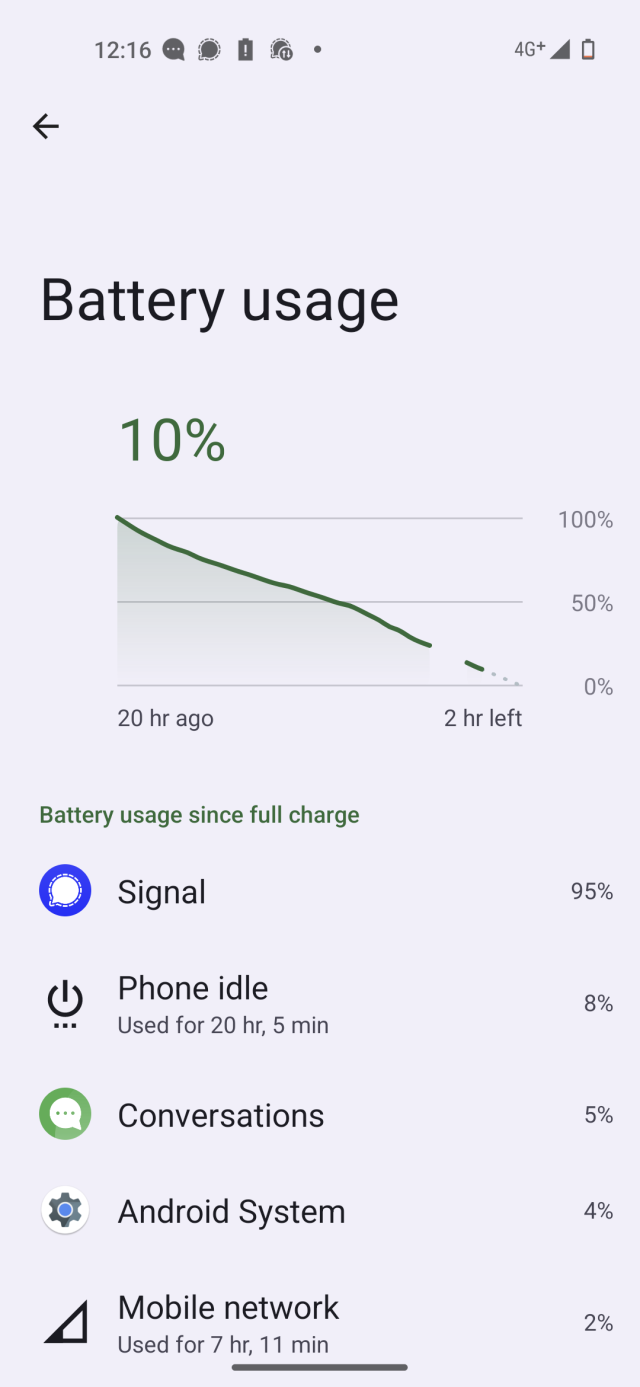I installed #Signal and #Conversations_im on a clean install of #GrapheneOS on my Pixel 4a and measured the battery impact. The results are shocking!
Both messengers had only one contact: my regular phone.
I used my regular phone to send messages to the Pixel 4a (which was not used for anything else over the course of the experiment).
I always sent the same message via Signal and #XMPP (mixing up which app went first). In total I sent ~32 messages in intervals of 10mins to a few hours.
reshared this

مسعود
in reply to Daniel Gultsch • • •Truly shocking.
What push mechanisms are you using for Signal and for Conversations?
MattJ
Unknown parent • • •@masoud
mathieui
in reply to Daniel Gultsch • • •adb
in reply to Daniel Gultsch • • •Remus
in reply to Daniel Gultsch • • •I would expect Conversations to perform a lot better since matrix is known to be more heavy on ressources but i mention it because it feels like an obvious direct competitor
iamreinder
in reply to Daniel Gultsch • • •床井 一郎
in reply to Daniel Gultsch • • •So I suspect Signal has a wakelock problem as they haven't tested extensively on devices without Play services? The battery drain is running at almost constant speed.
Conversations is great. There's not much to modify/customise before getting it to run on my devices.
yetzt
in reply to Daniel Gultsch • • •Sandro
in reply to Daniel Gultsch • • •Ichthyx
in reply to Daniel Gultsch • • •Râu Cao ⚡
in reply to Daniel Gultsch • • •Moritz
in reply to Daniel Gultsch • • •Signal consumes half of my battery (no google services or microG) · Issue #9729 · signalapp/Signal-Android
GitHubRâu Cao ⚡
Unknown parent • • •Râu Cao ⚡
Unknown parent • • •Marek
in reply to Daniel Gultsch • • •n00b0ss
in reply to Daniel Gultsch • • •Marcus Adams
in reply to Daniel Gultsch • • •pixelschubsi
in reply to Daniel Gultsch • • •Iak
in reply to Daniel Gultsch • • •meejah
Unknown parent • • •@masoud A big part of the reason centralized push-notifications (aka "Google Play Services") exist is for battery optimization.
You could of course just let Signal use Play Services on graphene if you like.
My experience is different (although I only have Signal, not matrix). My refurbished 7a with GrapheneOS and no Play Services at all in the owner profile lasts easily two days. (That said, it'll mostly be on WiFi while I'm at home -- so possibly the difference is that?)
Jona Joachim
in reply to Daniel Gultsch • • •CryptGoat
in reply to Daniel Gultsch • • •@leX 🤘🏻
in reply to Daniel Gultsch • • •Similar observations here, though with Google Play Services notifications...
Switched to Molly in the UnifiedPush variant with ntfy as provider and it got way better!
No problem anymore at that front.